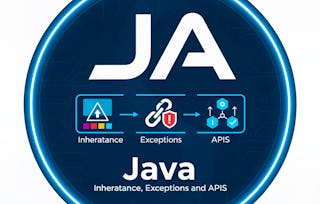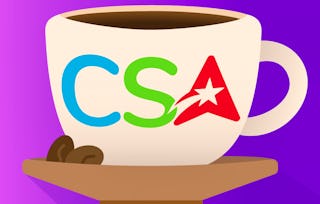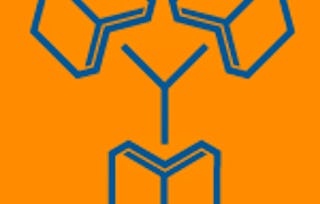Ce cours offre un aperçu complet de l'héritage Java, y compris les modificateurs d'accès et les méthodes de surcharge. Les étudiants sont initiés aux classes abstraites et apprendront à lire et écrire dans des fichiers, à utiliser des expressions régulières pour analyser du texte et à exploiter des structures de données complexes telles que les collections et les cartes.

Héritage et Structures de Données en Java

Héritage et Structures de Données en Java
Ce cours fait partie de Spécialisation Introduction à la programmation avec Python et Java

Instructeur : Brandon Krakowsky
13 185 déjà inscrits
Inclus avec
106 reviews
Expérience recommandée
Ce que vous apprendrez
Examinez le concept d'héritage dans la programmation orientée objet et apprenez à étendre les classes et à remplacer les méthodes d'une sous-classe.
Analysez et corrigez les différentes parties d'un programme Java à l'aide du débogueur interactif d'Eclipse.
Explorez différentes méthodes pour ouvrir, lire et écrire dans des fichiers externes, et gérez les erreurs et les exceptions.
Examinez les techniques avancées de stockage et de manipulation des données dans les collections et analysez le texte à l'aide d'expressions régulières (ou regex).
Compétences que vous acquerrez
- Catégorie : structures de données
- Catégorie : Résolution de problèmes
- Catégorie : Principes de programmation
- Catégorie : Conception de logiciels
- Catégorie : Débogage
- Catégorie : Eclipse (Logiciel)
- Catégorie : Programmation Java
- Catégorie : Environnement de développement
- Catégorie : Fichier E/S
- Catégorie : Java
- Catégorie : Programmation orientée objet (POO)
- Catégorie : Environnements de développement intégré
Détails à connaître

Ajouter à votre profil LinkedIn
9 devoirs
Découvrez comment les employés des entreprises prestigieuses maîtrisent des compétences recherchées

Élaborez votre expertise du sujet
- Apprenez de nouveaux concepts auprès d'experts du secteur
- Acquérez une compréhension de base d'un sujet ou d'un outil
- Développez des compétences professionnelles avec des projets pratiques
- Obtenez un certificat professionnel partageable

Il y a 4 modules dans ce cours
Nous commencerons ce module en parlant de l'héritage, un concept central de la programmation orientée objet. Il s'agit du mécanisme par lequel une classe hérite des champs et des méthodes d'une autre classe. Nous aborderons ensuite un autre aspect du polymorphisme, la surcharge, qui consiste à créer une méthode dans une sous-classe ayant la même signature qu'une méthode dans une superclasse. En particulier, nous étudierons la surcharge de la méthode toString pour imprimer vos objets et de la méthode equals pour comparer vos objets, notamment en ce qui concerne les tests unitaires. Enfin, nous verrons comment vous pouvez restreindre la portée d'un programme en utilisant des modificateurs pour contrôler l'accès aux variables, aux méthodes et aux classes.
Inclus
19 vidéos7 lectures3 devoirs1 élément d'application
Saviez-vous que vous pouvez déclarer une méthode sans la définir ? Cela revient à donner à une méthode un nom, voire des paramètres et un type de retour, sans aucun code dans le corps de la méthode. C'est ce qu'on appelle les méthodes abstraites. Pour définir des méthodes abstraites, nous apprendrons à créer des classes abstraites. Grâce à ces nouveaux concepts et structures, nous continuerons à élargir nos connaissances de Java et à développer nos compétences en matière de programmation. Nous apprendrons également à mieux déboguer nos programmes en les exécutant de manière interactive à l'aide du débogueur d'Eclipse. Cela nous permettra d'observer le code source et les variables pendant l'exécution.
Inclus
14 vidéos6 lectures2 devoirs1 élément d'application
Il existe plusieurs façons de charger et de stocker des données en Java. Les informations peuvent être stockées et manipulées dans différents types de structures de données. Mais les données peuvent également être stockées dans des fichiers externes, puis chargées dans Java. Dans ce module, nous verrons comment Java peut communiquer avec le monde extérieur en ouvrant, en lisant et en écrivant dans des fichiers externes. Ce moyen de communication, connu sous le nom d'E/S ou entrée/sortie, est extrêmement puissant et offre un nombre impressionnant d'options. Une E/S donnée n'est pas particulièrement difficile, mais la difficulté consiste à trouver son chemin dans le labyrinthe des possibilités. Ce module vous guidera à travers les différentes façons d'interagir avec les fichiers externes. En outre, il vous montrera les méthodes que vous pouvez utiliser pour gérer les erreurs et les exceptions qui peuvent survenir dans vos programmes Java. En particulier, lorsque vous traitez avec des fichiers.
Inclus
18 vidéos3 lectures2 devoirs1 élément d'application
Dans ce module, nous allons examiner quelques techniques avancées pour stocker et manipuler des données dans des collections, qui sont des groupes structurés d'objets. Plus précisément, nous allons apprendre à exploiter le cadre des collections de Java, qui est une architecture unifiée permettant de représenter et de manipuler différents types de collections. Nous avons déjà acquis de l'expérience en travaillant avec un type de collection en particulier, à savoir la liste de tableaux (ArrayList). Nous apprendrons également à utiliser les cartes, qui sont des dictionnaires associant des clés à des valeurs. Ce module vous donnera également un aperçu de certaines techniques avancées d'analyse de texte. En particulier, nous apprendrons à utiliser les expressions régulières ou regex, qui sont des séquences spéciales de caractères décrivant des motifs utilisés pour rechercher, éditer et manipuler du texte et des données.
Inclus
21 vidéos4 lectures2 devoirs1 élément d'application
Obtenez un certificat professionnel
Ajoutez ce titre à votre profil LinkedIn, à votre curriculum vitae ou à votre CV. Partagez-le sur les médias sociaux et dans votre évaluation des performances.
Instructeur

Offert par
En savoir plus sur Développement de logiciels
 Statut : Essai gratuit
Statut : Essai gratuit Statut : Essai gratuit
Statut : Essai gratuitUniversity of California San Diego
 Statut : Essai gratuit
Statut : Essai gratuit Statut : Prévisualisation
Statut : Prévisualisation
Pour quelles raisons les étudiants sur Coursera nous choisissent-ils pour leur carrière ?

Felipe M.

Jennifer J.

Larry W.

Chaitanya A.
Avis des étudiants
- 5 stars
78,30 %
- 4 stars
14,15 %
- 3 stars
1,88 %
- 2 stars
0,94 %
- 1 star
4,71 %
Affichage de 3 sur 106
Révisé le 6 juil. 2025
This course is good for understanding some basic concepts of Java
Révisé le 28 avr. 2021
The lectures are good! However, some descriptions in assignments are not clear.
Révisé le 17 août 2021
More examples for Collections and Maps should be added

Ouvrez de nouvelles portes avec Coursera Plus
Accès illimité à 10,000+ cours de niveau international, projets pratiques et programmes de certification prêts à l'emploi - tous inclus dans votre abonnement.
Faites progresser votre carrière avec un diplôme en ligne
Obtenez un diplôme auprès d’universités de renommée mondiale - 100 % en ligne
Rejoignez plus de 3 400 entreprises mondiales qui ont choisi Coursera pour les affaires
Améliorez les compétences de vos employés pour exceller dans l’économie numérique
Foire Aux Questions
Les seules mathématiques dont les apprenants auront besoin pour cette Specializations sont l'arithmétique et des concepts de base en logique.
Si vous avez apprécié ce cours, nous vous recommandons les cours 1, 2 et 3 de la série !
Si vous souhaitez apprendre les bases de l'informatique au-delà des bases de la programmation, envisagez de vous inscrire au Master of Computer and Information and Technology (MCIT) de l'Université de Pennsylvanie, un programme de master en informatique de l'Ivy League destiné aux personnes n'ayant pas de formation en informatique. Pour une expérience sur le campus, explorez ici. Si vous préférez un environnement en ligne, postulez au MCIT en ligne. En fait, les cours de cette série sont également utilisés dans le cadre du programme de diplôme en ligne ! Le certificat de Specializations sera considéré favorablement par le comité d'admission, n'oubliez donc pas de le mentionner lors de votre candidature.
Pour accéder aux supports de cours, aux devoirs et pour obtenir un certificat, vous devez acheter l'expérience de certificat lorsque vous vous inscrivez à un cours. Vous pouvez essayer un essai gratuit ou demander une aide financière. Le cours peut proposer l'option "Cours complet, pas de certificat". Cette option vous permet de consulter tous les supports de cours, de soumettre les évaluations requises et d'obtenir une note finale. Cela signifie également que vous ne pourrez pas acheter un certificat d'expérience.
Plus de questions
Aide financière disponible,

